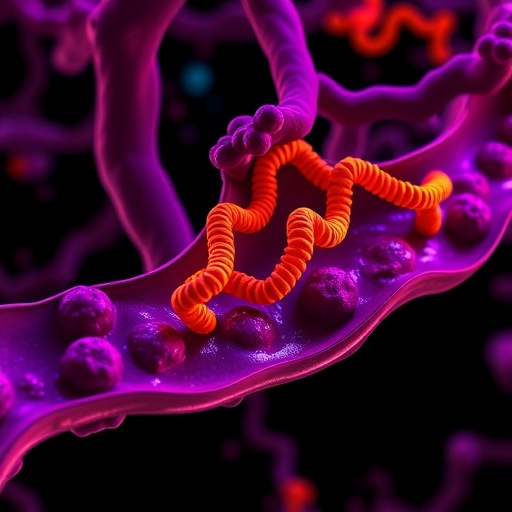Recent advancements in the oncology field have unveiled a complex relationship between cancer-associated fibroblasts (CAFs) and pancreatic cancer cells, revealing a new layer of metabolic and immune interaction that could reshape therapeutic strategies. In a groundbreaking study led by Zhang et al., published in the Journal of Translational Medicine, the intricate crosstalk between these cellular entities has been thoroughly examined. Understanding the mechanisms underlying this interaction is crucial as pancreatic cancer remains one of the most lethal forms of cancer, and new treatment avenues are desperately needed.
Despite representing only a small fraction of the cellular composition within tumors, CAFs play a pivotal role in tumor progression and immune evasion. The research team utilized advanced techniques to map the metabolic exchanges between CAFs and pancreatic cancer cells, suggesting that these exchanges could be exploited to inhibit tumor growth. Importantly, the findings put forth by Zhang and colleagues propose that manipulating the metabolic interactions could potentially enhance the efficacy of existing therapies.
The study meticulously documents how CAFs enhance the metastatic potential of pancreatic cancer cells by providing them with essential metabolites. By altering the local microenvironment, CAFs facilitate not only the survival but also the aggressive behavior of neighboring cancer cells. This metabolic symbiosis indicates that cancer therapies should target not just cancer cells, but also the supportive stromal cells, which could drastically change the approach to treatment.
Zhang and the research team employed various experimental models, including co-culture systems and genetically engineered mice, to explore the bioenergetics of CAFs. Their results highlight that CAFs can modify their metabolic state in response to signals from pancreatic cancer cells. This adaptation empowers them to create a supportive niche that bolsters tumor growth. The particulars of these metabolic pathways offer tantalizing insights into how we can potentially manipulate them to disrupt the crosstalk that supports tumor development.
Intriguingly, the study identifies specific metabolites that are exchanged between CAFs and pancreatic cancer cells. For instance, lactate produced by cancer cells can be taken up by CAFs to produce pyruvate and other crucial substrates necessary for ATP production. This process not only nurtures the survival of CAFs but also amplifies their supportive role in maintaining tumor growth. Hence, targeting these metabolic exchanges could lead to innovative therapeutic strategies capable of thwarting tumor progression.
The immune framework of the tumor is another critical piece of the puzzle. The research emphasizes that CAFs can inhibit immune cell activity through various mechanisms, including the secretion of immunosuppressive factors that distance the immune system from tumor cells. By fostering an immune-tolerant environment, CAFs protect pancreatic cancer cells from being targeted by the body’s natural defenses, creating a challenging landscape for treatment.
Zhang et al. suggest that interventions aimed at disrupting the communication between CAFs and pancreatic cancer cells could reinvigorate immune responses. By blocking key metabolic pathways utilized by CAFs, it may be possible to restore the effectiveness of therapies like checkpoint inhibitors, which have shown limited efficacy in pancreatic cancers thus far. This paradigm shift in the understanding of tumor-immune interactions opens new avenues for combination therapies.
Moreover, the study paints a broader picture of how CAFs might influence cancer cell behavior beyond mere metabolism. It speculates that a better understanding of the signaling pathways involved in this crosstalk can provide insights into tumor heterogeneity. Pancreatic cancers are notoriously diverse, and the role of CAFs could be pivotal in determining the aggressive nature of different tumor subtypes.
Furthermore, the authors emphasize the necessity for more personalized approaches in cancer treatment. As each patient’s tumor microenvironment is unique, therapeutic strategies must be tailored to consider the metabolic status of both CAFs and cancer cells in individual patients. A ‘one-size-fits-all’ approach could fail if it does not account for these crucial interactions.
The implications of this research extend beyond pancreatic cancer. The influence of stromal cells such as fibroblasts on tumor biology has the potential to reshape treatment approaches across various cancer types. By establishing the foundational principles of CAF-cancer interactions, this research invites further exploration into other malignancies where similar processes may occur.
In conclusion, Zhang et al.’s study signifies a critical step forward in our understanding of the interplay between cancer-associated fibroblasts and pancreatic cancer cells. It establishes a compelling case for targeting metabolic and immune interactions as a dual-pronged strategy in cancer therapy. This innovative approach could help to foster a new generation of cancer therapies that dramatically improve patient outcomes in this devastating disease.
By highlighting the importance of metabolic crosstalk and immune evasion in pancreatic cancer, this research emphasizes the need for interdisciplinary collaboration among oncologists, immunologists, and metabolic scientists. Future studies will undoubtedly build upon these findings to explore practical applications in patient care, thereby enhancing our capacity to combat this relentless disease.
The journey to fully deciphering the complex interactions within the tumor microenvironment may still be in its infancy. However, breakthroughs like those of Zhang et al. pave the way for future research that could lead to significant improvements in treatment effectiveness, and ultimately, survival rates for pancreatic cancer patients.
Subject of Research: Metabolic and immune crosstalk between cancer-associated fibroblasts and pancreatic cancer cells.
Article Title: Metabolic and immune crosstalk between cancer-associated fibroblasts and pancreatic cancer cells
Article References:
Zhang, Q., Cao, Z., Yan, S. et al. Metabolic and immune crosstalk between cancer-associated fibroblasts and pancreatic cancer cells.
J Transl Med 23, 1118 (2025). https://doi.org/10.1186/s12967-025-07164-0
Image Credits: AI Generated
DOI: 10.1186/s12967-025-07164-0
Keywords: Cancer-associated fibroblasts, pancreatic cancer, metabolic crosstalk, immune evasion, tumor microenvironment, therapeutic strategies.




